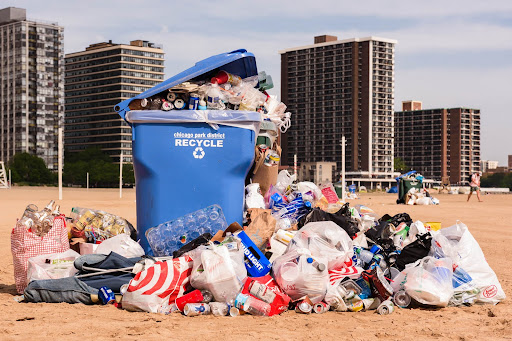
Tell your state legislators to support producer responsibility
Washington’s natural wonders enrich our lives in countless ways. Here are our Environment Washington's program priorities for 2024 to protect Washington's air, water, and special places.
Take Action
Environment Washington is a policy and action group with one mission: to restore and protect the natural world. Our staff works for clean air, clean water, clean energy, wildlife, open spaces, and a livable climate. Our members across the state put grassroots support behind our research and advocacy. Environment Washington is part of Environment America, a national network of 30 state environmental groups.
Here are our program priorities for 2024.
Environment Washington Advocate Pam Clough at a clean-up event we organized with the Plastic Free WA coalition.
Photo by Sara Holzknect | TPIN
Photo by Pam Clough | Used by permission
Too often, marine life mistake plastic as food and starve as a result.
Photo by Davdeka | Shutterstock.com
1of 3
Nothing we use for a few minutes should pollute the environment and harm wildlife for hundreds of years. Plastic pollution is creating an environmental disaster for ocean wildlife: plastic and other marine debris kills millions of seabirds and marine mammals every year. Plastic also contributes to climate change at every step of its lifecycle, from production to pollution. It’s time to move beyond single-use plastic by getting rid of the most harmful waste, and stopping the use of things we truly don’t need. That’s why Environment Washington supports:
The throwaway economy causes us to generate too much waste, in the form of single-use plastics and packaging as well as short-lived consumer objects. Americans dispose of 416,000 cell phones per day, and only 15 to 20 percent of electronic waste is recycled. We are working to tackle planned obsolescence, and make sure consumers and small businesses have access to the parts, tools and service information they need to repair products so we can keep things in use and reduce waste. Environment Washington supports HB 1193, which will give Washingtonians the right to repair their own devices, consumer electronics, home appliances, agricultural equipment, and electronic wheelchairs.
A sea otter enjoying their time in a kelp forest
Photo by Mike Baird | CC-BY-2.0
Photo by NOAA via Pixabay | Public Domain
Environment Washington staff and volunteers hold a banner display in Tacoma, WA.
Photo by Pam Clough | Used by permission
Kelp bed in the Pacific Northwest
Photo by Pam Clough | Used by permission
Washington's rocky, rugged Pacific coastline on the Olympic Peninsula.
Photo by Pam Clough | Used by permission
Evergreen forest lining the Pacific Coast.
Photo by Pam Clough | Used by permission
Photo by Pam Clough | Used by permission
1of 7
Our state is rich with sandy beaches, rocky coves, towering sea cliffs and an astonishing variety of marine wildlife along our shores. Yet there are challenges. The previous administration pushed for oil and gas drilling in 90 percent of our coastal waters. The Southern Resident orcas that reside in Puget Sound and the Pacific Coast are staring at extinction due to reduced quantity and quality of their main food source, Chinook salmon, harmful pollutants, and excess vessel noise which can interfere with their hunting. Environment Washington supports:
Transportation is the number one source of our state and country’s carbon pollution, as well as contributing to air and water pollution which has significant health impacts. To slow global warming and reduce this pollution, we need to change how Washingtonians get around. New federal funding makes investing in clean transportation more accessible for Washington. We support:
We have the ability to harness clean, abundant energy from the sun, the wind and the earth, and to fully repower our society with 100 percent renewable sources. But reaching Washington’s commitment to 100% clean energy by 2045 requires that we invest today in that future. That’s why Environment Washington supports:
Too many Washingtonians are exposed to harmful chemicals like lead or PFAS (per and polyfluoroalkyl substances) through everyday consumer products or even through their own drinking water. Environment Washington supports:
Our forests, both in Washington and across the globe, and on land and underwater, provide habitat for critical species and help us fight climate change. Environment Washington is calling on major companies like Costco to stop purchasing products logged from primary forests and require paper products to include at least 50% recycled content. State and local policies should protect critical forest and trees from logging, degradation and deforestation.
Human development has fragmented key habitats into disparate populations. If these populations remain separated, species will be unable to adapt to climate change because of shrinking genetic diversity. Many salmon species are endangered due to disruptions in their migration from the sea to inland headwaters. Further, animals that try to cross roads that cut through their previous migratory routes cause increased animal-motorist collisions. We support investments in infrastructure that reconnect nature, making it easier for wildlife to migrate, locate food and find mates. Additionally, we support Recovering America’s Wildlife Act in Congress, which would provide federal funding to help protect endangered species.
As an advocate with Environment Washington, Pam develops and runs campaigns to protect Washington's air, water, and special places. She has worked on issues ranging from clean energy climate solutions, preventing plastic pollution, defending clean water, and protecting our special natural spaces. Pam lives in Steilacoom, Washington, where she enjoys kayaking on the Puget Sound, gardening and hiking in the surrounding mountains.
